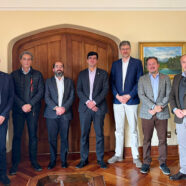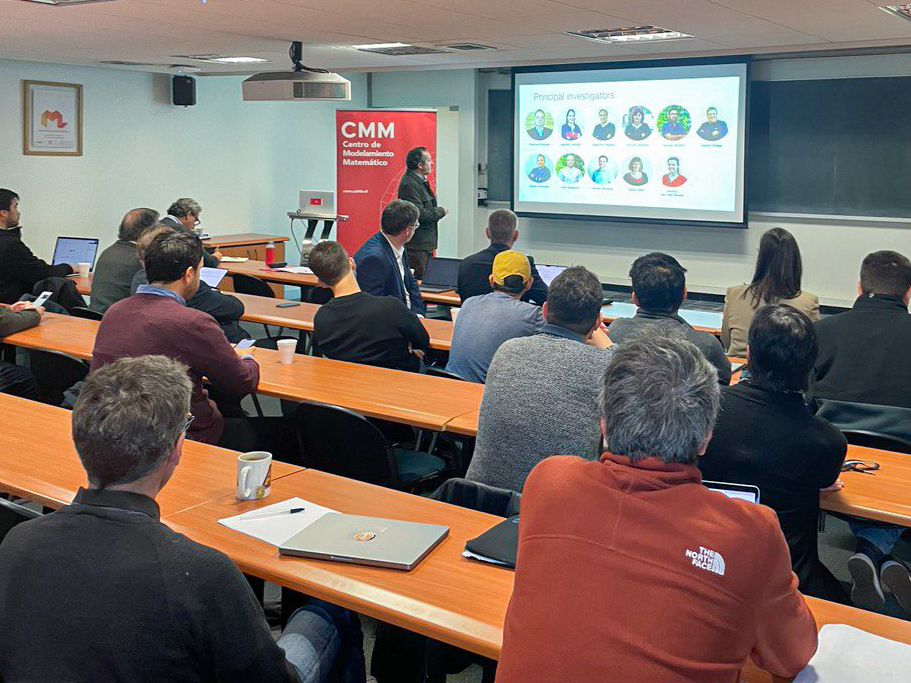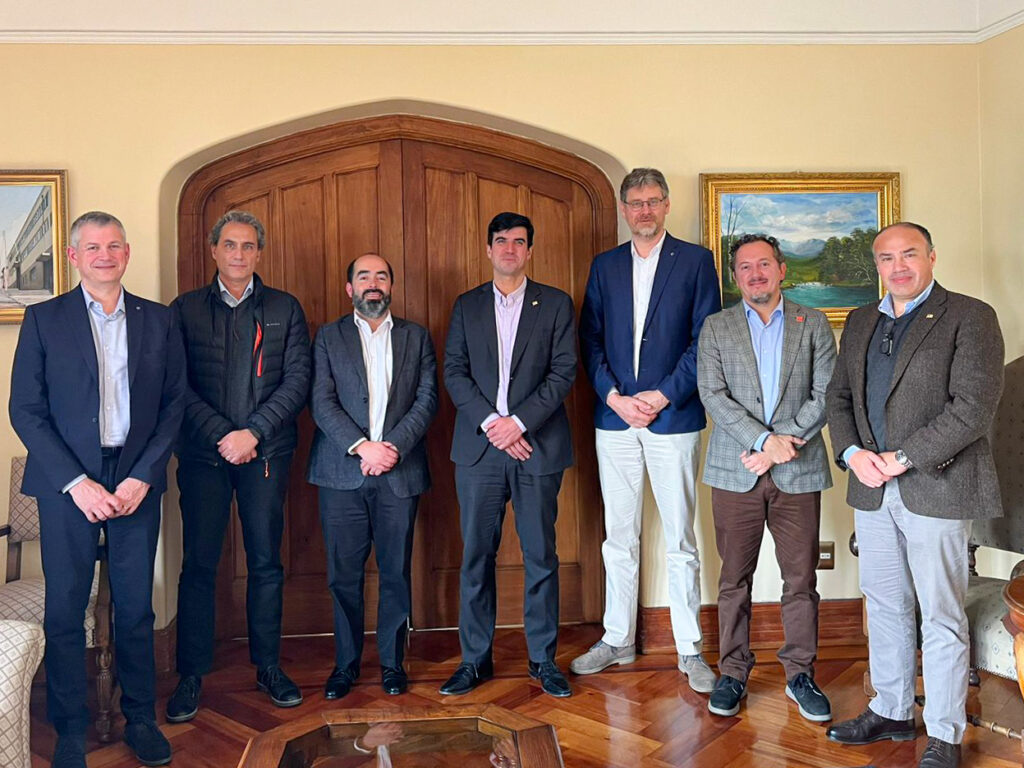
French authorities evaluated in Santiago the affiliation until 2030 of the Center for Mathematical Modeling of the University of Chile.
In a meeting of strategic relevance for science and international collaboration, two authorities from the French National Center for Scientific Research (CNRS) visited Chile to evaluate the continuity of the Center for Mathematical Modeling (CMM) as its International Research Laboratory (IRL) #2807. This affiliation, which has been in force since 2000 and is renewed every five years, represents a fundamental pillar in the scientific collaboration between both nations.
The CMM, located at the Faculty of Physical and Mathematical Sciences of the University of Chile (851 Beauchef Avenue, Santiago), is currently a leader in mathematical modeling in Latin America and has established itself as a center of excellence of the National Agency for Research and Development (ANID). It is also the home of the Supercomputer of Chile (NLHPC), the Copernicus Regional Center for Latin America and the Caribbean (CopernicusLAC Chile) and the astronomical broker ALeRCE (Automatic Learning for the Rapid Classification of Events). Its mission is clear and ambitious: to develop high quality mathematics to address challenges in diverse disciplines such as data science, climate and biodiversity, education, resource management, mining and digital health.

The director of the Center for Mathematical Modeling, Héctor Ramírez, presents to the French authorities.
CNRS in Chile
The CNRS, which is today the largest fundamental science agency in Europe and is about to turn 85 years old, sent Christophe Besse, director of the National Institute of Mathematical Sciences and their Interactions (INSMI), and Jean-Stéphane Dhersin, deputy scientific director and in charge of international relations at INSMI, for the evaluation.
During their visit, on May 9 and 10, both authorities held meetings with the director of the CMM, Héctor Ramírez, the researchers Alejandro Maass, Maya Stein, Salomé Martínez, Claudio Muñoz, Jaime Ortega and Avelio Sepúlveda, and the coordinator of External Relations, Eduardo Vera. They also met with the CMM/CNRS delegation, the Dean of the FCFM, Francisco Martínez, the Deputy Director of Centers and Associative Research of ANID, Nicole Ehrenfeld, and the Rector of the Universidad Técnica Federico Santa María, Juan Yuz Eissmann.
“We visited CMM to evaluate the laboratory’s affiliation with the University of Chile. We looked at whether we can still send people from France to Chile. In the last five years we have been able to send available people every year, so it’s very good. And we also looked at how the CMM transfers innovative mathematics to companies. We are very happy to see that we have a very good collaboration with Europe because of Copernicus,” said Christophe Besse.
Along these lines, he remarked that “the good thing is that we have been able to see many researchers: mathematicians, biologists and physicists. For us it is very significant to be able to put mathematics in contact with other disciplines. The CMM is our first international laboratory, not only for mathematics, but for all disciplines. So it is a very important laboratory for us and we are very happy to be able to do research with many people in France.”
Jean-Stéphane Dhersin complemented that “the CMM is very important for us because the scientific objectives of the women of the CMM are very connected to the focus of the CNRS in France. Therefore, it is very relevant for us to send researchers to discuss with CMM researchers so that we can continue working together (…) It seems good to us to be able to send people from France to have a long visit, (stay) of six months or a year, at the University of Chile”.
“This visit is very important because it is in situ. We met with the partner here at the University of Chile and with the people who are in charge of the CNRS in Chile. We were also able to discuss with the director Hector Ramirez about the line that we are developing in the CMM laboratory. During the stay we have seen many, many people. I would say that more than twelve people in this laboratory”, he detailed.
Affiliation 2025/2030
Preliminarily the director of CNRS Mathématiques, Christophe Besse, valued the visit and suggested the continuity of the affiliation for the period 2025/2030, which still has to be made official in the coming weeks. “We were very well received by all the people here in Chile. The evaluation was very good and we will certainly continue to collaborate with the University of Chile, with Dr. Hector Ramirez, and with all the people here at CMM. We look forward to continuing this fruitful collaboration with Chile,” he said.
Dhersin, in line with this optimism, added that “it was a very fruitful visit, so we will probably continue with this laboratory for the next five years, and hopefully for a long time.”
From the Chilean institution, the director of the Center for Mathematical Modeling, Héctor Ramírez, stressed the importance of a common agenda and continued collaboration between the two nations. “The renewal of our affiliation with the CNRS is a testament to the international recognition of the CMM as a center of excellence in mathematical modeling. This collaboration not only strengthens ties with one of the largest scientific institutions in Europe, but also ensures the continuity of high-impact research and the transfer of advanced knowledge in mathematics applied to problems of global relevance,” he said.
“The visit of the CNRS authorities has highlighted the importance of our interdisciplinary work. This approach allows us to transfer innovative mathematics to industry and public policy, demonstrating that our research has a tangible and beneficial impact on society. We are committed to excellence and development, therefore, this renewal reinforces our duty and motivates us to continue leading scientific research in Latin America, collaborating closely with our French colleagues”, said Professor Ramirez.

From left to right: Christophe Besse, Alejandro Maass, Pedro Gajardo (Vice Rector for Economic and Administrative Affairs USM), Juan Ignacio Yuz (Rector of the Universidad Técnica Federico Santa María, USM), Jean-Stéphane Dhersin, Héctor Ramírez and Andrés Fuentes (Academic Vice Rector USM).
Center for Mathematical Modeling
The CMM is today the most active scientific research institution in mathematical modeling in Latin America. It is a center of excellence of the National Agency for Research and Development (ANID) of Chile, integrated by eight partner universities and located at the Faculty of Physical and Mathematical Sciences of the University of Chile. It is also the International Research Laboratory (IRL) #2807 of the French National Center for Scientific Research (CNRS).
Its mission is to create mathematics in response to problems in other sciences, industry and public policy. It seeks to develop science with the highest standards, excellence and rigor in areas such as data science, climate and biodiversity, education, resource management, mining and digital health.
CNRS Mathématiques
The Centre National de la Recherche Scientifique (CNRS) is the French state research organization and the largest fundamental science agency in Europe. It has a budget of 4 billion euros, 33,000 employees – including 28,000 scientists – and 1,100 research laboratories in France and abroad.
CNRS Mathematics is one of the ten institutes in charge of fundamental research at the CNRS. Its mission is to structure and support the development of research in all aspects of mathematics, from the foundations of the discipline to its interaction with other sciences, industry and society. Previously known as the National Institute for Mathematical Sciences and their Interactions (INSMI), it changed its name to CNRS Mathématiques in October 2023.
© Alonso Farías Ponce, journalist at the Center for Mathematical Modeling.
Posted on Jul 4, 2024 in News




 Noticias en español
Noticias en español
